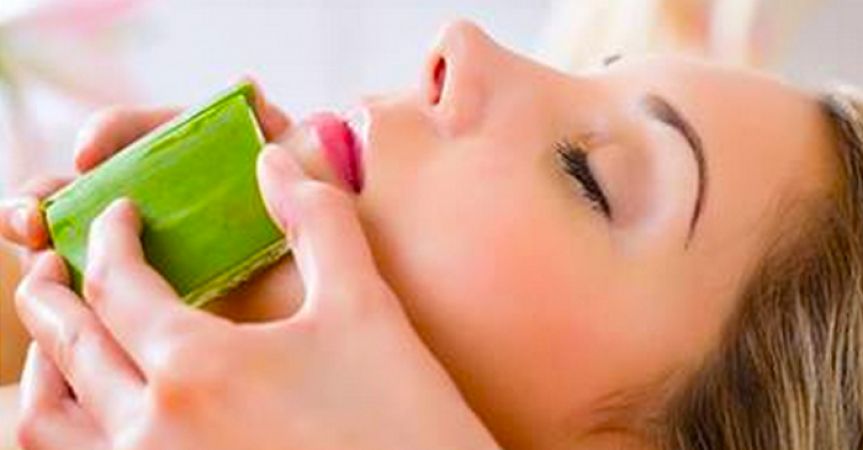
Aloe vera is widely recognized for its benefits for the skin, but it is also considered beneficial for hair care. Many people incorporate it into their hair care routine along with their skin care. It contains antioxidant, antibacterial, and antifungal properties that help address various skin problems. Additionally, it works to moisturize the skin, keeping it hydrated while maintaining a healthy glow. Aloe vera also contains vitamins A and E, which contribute to maintaining healthy skin.
While aloe vera is highly beneficial for the skin, there are certain things to avoid when using it.
Lemon Juice:
When mixing lemon juice with aloe vera gel for skincare, it's important to exercise caution. Lemon juice contains citric acid, which can be too harsh for the skin, especially when combined with other active ingredients like aloe vera. This combination may cause irritation, redness, or even burns, particularly for individuals with sensitive skin. The acidity of lemon juice can disrupt the skin's natural pH balance, leading to various skin problems.
It's essential to perform a patch test before applying any new skincare concoction to the face, especially for those with sensitive skin. To conduct a patch test, apply a small amount of the mixture on a small area of the skin, such as the inner wrist or behind the ear, and observe for any adverse reactions over the next 24 hours. If there's no irritation, redness, or itching, it's generally safe to use the mixture on the face.
Instead of mixing aloe vera with lemon juice, individuals can opt for direct application of aloe vera gel to the skin. Aloe vera contains soothing properties that can help calm irritated skin and alleviate various skin issues such as inflammation, acne, and sunburn. Applying aloe vera gel directly to the skin and leaving it on for about 15 minutes before rinsing off can promote healthier and more radiant-looking skin without the risk of adverse reactions from acidic ingredients like lemon juice.
Toothpaste:
The notion of using toothpaste as a skincare remedy to achieve glowing skin is a common misconception. Toothpaste contains various ingredients such as fluoride, abrasives, and detergents, which are formulated for cleaning teeth and maintaining oral hygiene. While toothpaste may have some drying or antibacterial properties that can potentially reduce acne inflammation, it's not designed for use on the delicate skin of the face.
Applying toothpaste to the skin can lead to adverse effects such as irritation, redness, dryness, or even chemical burns. Toothpaste formulations vary widely, and some may contain abrasive particles or harsh chemicals that can damage the skin's protective barrier and disrupt its natural balance. Additionally, toothpaste may contain menthol or other cooling agents that can cause a tingling or burning sensation on the skin.
Instead of relying on toothpaste for skincare, individuals should opt for products specifically formulated for facial use, such as gentle cleansers, moisturizers, and acne treatments. These products are designed to address specific skincare concerns without causing harm or irritation to the skin. It's essential to choose skincare products that are suitable for one's skin type and concerns and to follow a consistent skincare routine to maintain healthy and radiant-looking skin.
Baking Soda:
Baking soda, also known as sodium bicarbonate, is a versatile household ingredient that is commonly used for baking, cleaning, and deodorizing. While baking soda may have some exfoliating or cleansing properties, it's not recommended for use on the face, especially when combined with aloe vera gel.
Baking soda is highly alkaline, with a pH level of around 9, whereas the skin's natural pH is slightly acidic, typically ranging from 4.5 to 5.5. Applying baking soda to the skin can disrupt its pH balance, leading to irritation, dryness, and increased sensitivity. Baking soda is also abrasive and can cause micro-tears in the skin's surface, making it more susceptible to infection or inflammation.
Instead of using baking soda with aloe vera for skincare, individuals can opt for gentler exfoliants or cleansers specifically formulated for facial use. These products typically contain ingredients such as alpha hydroxy acids (AHAs), beta hydroxy acids (BHAs), or enzymes that help to slough off dead skin cells, unclog pores, and improve skin texture without causing irritation or damage. It's important to use exfoliating products in moderation and to follow up with a moisturizer to replenish lost moisture and prevent dryness or irritation.
In conclusion, while aloe vera offers numerous benefits for the skin, it's crucial to be cautious when combining it with other substances. Avoid mixing it with lemon juice, toothpaste, or baking soda to prevent adverse effects on the skin. Instead, opt for direct application of aloe vera gel to reap its benefits effectively.
Can Adding Milk to Tea Cause Harm? Experts Weigh In
These 2 Tricks Can Help You Get Rid of Belly and Hip Fat
How Consuming This One Thing Can Solve Chronic Constipation: Here's How to Do It